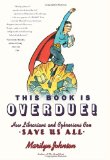How Librarians and Cybrarians Can Save Us All
by Marilyn Johnson
Harper, 2010. 272 pages.
Starred Review
Two and a half weeks ago, I got laid off from the job I love so much as Youth Services Manager at a busy public library. Since last Fall, we knew serious budget cuts were being threatened. In the campaign to convince the community and particularly the Board of Supervisors that public libraries are essential services, not luxuries, I became more and more proud to be a librarian.
We were not successful, and I’m very sad to leave the job I love, and very sad for the community. The people who will be particularly hurt by the budget cuts are students who don’t have internet access, people out of work looking for jobs, people who need to learn English, homeless people who want somewhere to stay and learn during the day, young moms who want to get their children comfortable around books, and so many others.
This book is indeed overdue! I wished so much that I could afford to send a copy to each member of the county Board of Supervisors! Marilyn Johnson looks at many different aspects of librarianship and explains why we need librarians more than ever in the information age, as well as in a recession. This book also made me proud to be a librarian.
Here are some quotations I enjoyed:
“Good librarians are natural intelligence operatives. They possess all of the skills and characteristics required for that work: curiosity, wide-ranging knowledge, good memories, organizational and analytical aptitude, and discretion.”
“The profession that had once been the quiet gatekeeper to discreet palaces of knowledge is now wrestling a raucous, multiheaded, madly multiplying beast of exploding information and information delivery systems. Who can we trust? In a world where information itself is a free-for-all, with traditional news sources going bankrupt and publishers in trouble, we need librarians more than ever.”
“Librarians’ values are as sound as Girl Scouts’: truth, free speech, and universal literacy. And, like Scouts, they possess a quality that I think makes librarians invaluable and indispensable: they want to help. They want to help us. They want to be of service. And they’re not trying to sell us anything. But as one librarian put it, ‘The wolf is always at the door.’ In tight economic times, with libraries sliding farther and farther down the list of priorities, we risk the loss of their ideals, intelligence, and knowledge, not to mention their commitment to access for all — librarians consider free access to information the foundation of democracy, and they’re right. Librarians are essential players in the information revolution because they level that field. They enable those without money or education to read and learn the same things as the billionaire and the Ph.D. In prosperous libraries, they loan out laptops; in strapped ones, they dole out half hours of computer time. They are little ‘d’ democrats of the computer age who keep the rest of us wired.
“In tough times, a librarian is a terrible thing to waste.”
This book explores many different aspects of librarianship. They weren’t surprising to me, having plunged into this world twelve years ago and found it home. But some of the chapters will be surprising to the general public. Marilyn Johnson’s giving away some of our secrets — like the Book Cart Drill Team Championships at ALA National Conference. She talks about librarians taking a stand for freedom of speech, librarians blogging, librarians interested in archiving all sorts of obscure topics.
I like the way she finishes the book:
“It didn’t matter who I was, or what I did, or where I paid taxes, or how long I stayed. I’m sure it didn’t matter if the book had RFID tags or a checkout card with a ladder of scrawled names, though tags were neat. I knew the librarians would help me figure out anything I needed to know later — This town is hurting economically, right? How many parking spaces in your lot? What do you call sign-making skills (wayfinding)? And which of your librarians likes figs?
“I was under the librarians’ protection. Civil servants and servants of civility, they had my back. They would be whatever they needed to be that day: information professionals, teachers, police, community organizers, computer technicians, historians, confidantes, clerks, social workers, storytellers, or, in this case, guardians of my peace.
“They were the authors of this opportunity — diversion from the economy and distraction from snow, protectors of the bubble of concentration I’d found in the maddening world. And I knew they wouldn’t disturb me until closing time.”
Find this review on Sonderbooks at: www.sonderbooks.com/Nonfiction/overdue.html
Disclosure: I am an Amazon Affiliate, and will earn a small percentage if you order a book on Amazon after clicking through from my site.
Source: This review is based on a library book from the Fairfax County Public Library.
